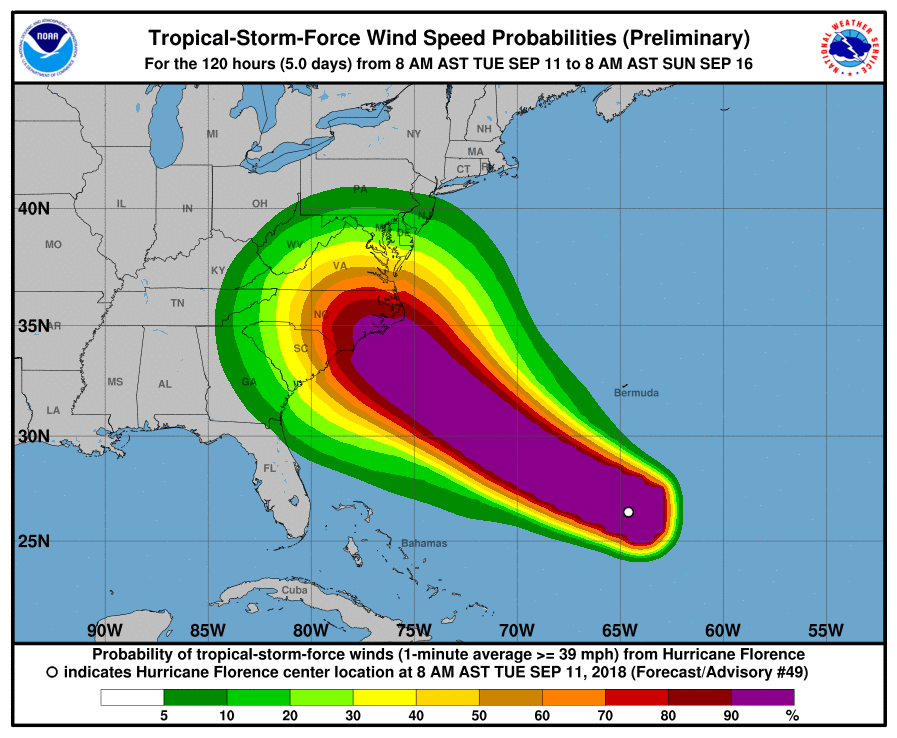



The eye of the storm: how to protect yourself, your neighbours and your pigs when Hurricane Florence hits
As Hurricane Florence begins to move in from the coast into Carolina, it is important to follow expert advice when it comes to protecting your pigs and preparing for the storm to hitAccording to a report by AgWeb, around 13 percent of US pork production is located in North Carolina where the downgraded category 2 storm is quickly progressing through.
It is predicted that winds will reach over 100mph and around 13ft of storm surge flooding will hit both North and South Carolina before the weekend, resulting in potentially catastrophic damage to farms and local infrastructure. Tornadoes could also reside in the two states as the storm moves inland.
JOINT BASE ANDREWS, Md. - National Hurricane Center's projected path for Hurricane Florence.
With the storm likely to knock out power supplies, damage water supplies and prevent access to resources, it is important that people prepare for the worst, especially farms where thousands of animals are at risk.
Not only will the storm likely cause mortalities in swine populations, but the flooding of pig waste piles could also allow the contamination of state waterways. This has been seen in the past when Hurricane Harvey and Hurricane Floyd hit Texas and Carolina, respectively.
Here are some top tips for preparing before the storm hits:
• It is of critical importance to continue watching the storm reports, listen out for storm warnings and, if told to evacuate, follow the instructions provided by local authorities and evacuate.
• Move animals to higher ground. If possible, move animals out of barns that are in flood-prone areas to facilities at other farms.
• Stock up on feed. Ensure you have adequate resources in case of disruptions to transportation and market access.
• Check the operating condition of your backup generators. Have adequate fuel and filters for several days of operations. Make sure automatic starting systems are ready to go.
• Make sure there is adequate propane gas on the farm and arrange an earlier than normal delivery if necessary.
• Make sure cell phones are fully charged and have rechargeable battery packs on hand in case land-line telephone service is lost.
• Secure outside objects on your farm (signs, tools, boxes) so they don't blow and cause damage.
• Check the security of roofing materials, pig house siding, and windows and doors to make sure they will not blow off or blow open. Corners and edges of buildings are particularly vulnerable.
• Be sure drainage ditches are free of debris and are adequate to move large volumes of water away from the pig barn.
• Be prepared to keep pigs longer than normal in case processing plants are unable to operate.
• Be sure that all equipment such as tractors and skid loaders are fully fuelled.
• Put important documents into waterproof containers.
• Have cash on hand, since some merchants without electricity might not be able to process credit and debit cards.
• If there is no electricity whatsoever, monitor house conditions more frequently and make adjustments as needed.
• If strong winds knock down trees, make farm lanes and houses accessible to delivery vehicles as soon as it is safe to do so.
• Assess lagoon levels and ensure storage levels can accommodate more than 25 inches of rain.
Sources: NC Pork Council; Delmarva Poultry Industry, Inc
Social media resources to help you track the storm and learn about weather advisories and warnings when they are issued include the National Hurricane Center (@NHC_Atlantic) and the National Weather Service offices in Wakefield, Virginia (@NWSWakefieldVA) and Mount Holly, NJ (@NWS_MountHolly).










